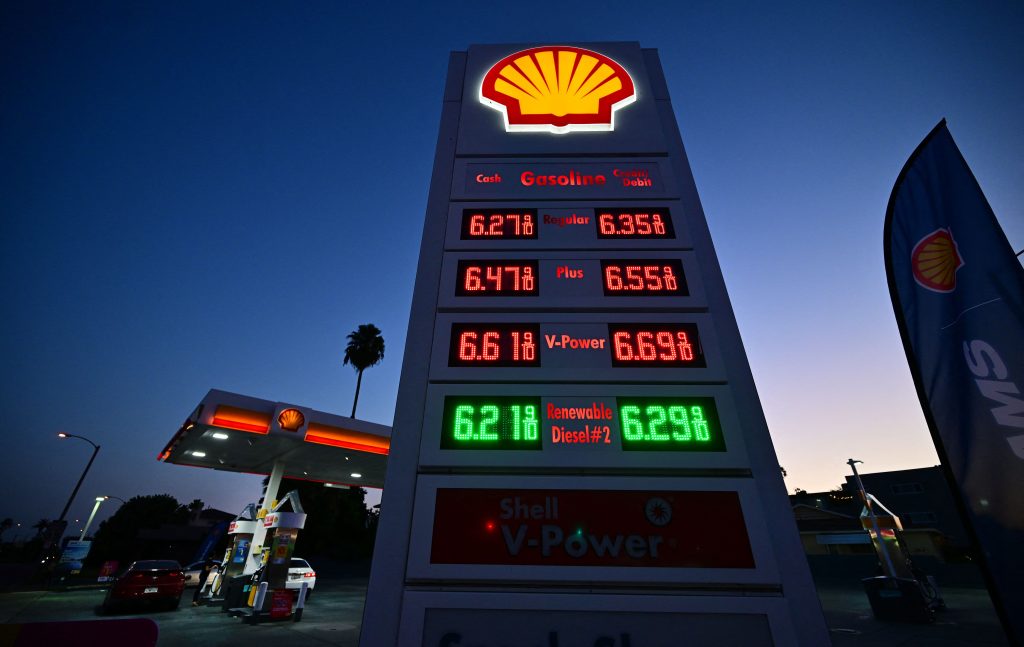Shell Plc will come head-to-head with the Dutch branch of Friends of the Earth on Tuesday to appeal a landmark 2021 ruling ordering the oil and gas giant to slash its emissions by the end of the decade.
The decision could prove to be a watershed moment for the oil industry in Europe, where major companies embraced the transition to clean energy during the pandemic but have since pivoted back toward fossil fuels as a surge in oil and gas prices delivered record profits. Just last month, Shell weakened its targets for emissions reductions in the coming decade.
In 2021, a trio of judges in The Hague ruled that Shell must reduce emissions by 45% by 2030 from 2019 levels. That’s equivalent to 740 million tons a year of carbon dioxide, more than the emissions of Germany. That’s far more ambitious than the company’s current plan for a reduction in its carbon intensity — not necessarily total emissions — of 15% to 20% by 2030.
Shell’s recent actions underscore the necessity of the ruling, said Donald Pols, head of Milieudefensie, the Dutch branch of Friends of the Earth.
By weakening its emissions targets “Shell confirms the basis of our argument — there is a regulatory gap,” Pols said in an interview in Amsterdam. “It is a middle finger to the climate and everyone affected by climate change.”
Shell agrees that the world needs urgent action on climate change but “where we have a different view is in how that goal should be achieved,” a company spokesperson said. “We are appealing the ruling because we do not believe it is the right solution for the energy transition. It is ineffective and even counterproductive to addressing climate change, and there is no legal basis for it under Dutch law.”
Cutting Emissions
Even before Shell’s emissions target was watered down, it was criticized for being based on a measure of the carbon released per unit of energy generated. That means the company could in theory increase absolute emissions by raising production in the near term, even as they satisfy their pledge to reduce carbon intensity.
“Shell’s climate policy was already substandard and with the new CEO it has deteriorated even further,” said Pols.
The company says that, when it comes to its 2050 goal for net zero emissions, there is no difference between targeting the carbon intensity of the energy products it sells and reducing absolute emissions.
Shell and Millieudefensie will face each other in court over four days until April 12. A win for the company would give Chief Executive Officer Wael Sawan, who took the job just over a year ago, more space for his priority of boosting investor returns. If the decision is upheld, Shell will have six years to comply with the ruling.
The court’s judgment states that Shell must reduce three types of carbon emissions. Scope 1, which come direct from their own operations, scope 2, which come from the energy they use, and scope 3, from their supply chain and customers. The vast majority of Shell’s emissions, around 90%, fall into the third category.
The judges didn’t prescribe how Shell has to go about slashing its emissions. It imposed a “strict best efforts obligation” that means it must “use its influence through the Shell group’s corporate policy, for example by imposing requirements on suppliers” to tackle scope 2 and 3.
Fuel Retail
If Shell loses its appeal, Millieudefensie would encourage the company to reduce its fossil fuel production.
“It would be an easy start for Shell not to invest in new oil and gas projects,” said Pols. “That should be a no brainer.”
However, the easiest way for the company to comply with the ruling could be to sell off its biggest source of its scope 3 emissions — fuel retail sites.
“The only way to for any oil company to materially reduce scope 3 emissions is divestment,” said Allen Good, Director of Equity Research at Morningstar. “Divesting the retail would go a long way toward doing that” because Shell’s fuel stations saddle the company with a large amount of emissions from selling refined products, even if it doesn’t produce them, he said.
A large scale sale of retail operations could rapidly reduce Shell’s scope 3 emissions, but wouldn’t make a difference to climate because the sites would keep supplying fuel to customers.
Shell has already said it plans to sell 1,000 retail sites over the next two years in response to a growing demand for electric vehicle chargers, equivalent to about 4% of its operated sites. The divestments will help the company meet its new ambition of reducing absolute emissions from the use of its oil products by as much as 20% by 2030, compared with 2021.
Selling retail would have a limited financial impact. Only 11% of Shell’s cash flow came from its marketing unit last year, which includes the sale of road fuels, electric vehicle charging, as well as lubricants and some low-carbon products. Almost three quarters of cash flow came from the production of oil and gas.
Such as divestment could also be counterproductive, according to Morningstar’s Good. “Shell plans to provide EV charging at these locations, which of course would ultimately reduce their carbon intensity and contribute to greater EV adoption.”


